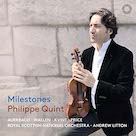

Philippe Quint: Milestones
Pentatone
The sixteen albums displayed on the discography page at violinist Philippe Quint's site confirm him to be a musician of remarkable breadth. Rather than specializing in one composer or two, the collection ranges from Paganini, Bach, and Tchaikovsky to Bernstein, Rorem, and Corigliano; there is nothing, it seems, this virtuoso can't do. Yet while each recording no doubt holds a special place in his heart, one suspects his latest, Milestones, is the one of greatest personal significance. On this hour-long set, Quint presents world premiere recording of pieces written for him by Lera Auerbach (b. 1973), Errollyn Wallen (b. 1958), and his own mother, Lora Kvint (b. 1953), and rounds out the programme with Florence Price's Adoration. Even though it's implied, the release could have been titled Personal Milestones, given that it celebrates the three decades that have passed since his professional debut and includes his first collaboration with Kvint. He shares, however, the album title with Wallen by featuring her first violin concerto and with Auerbach for including the first commercially available recording of a large symphonic work by her.
The performances by Quint, an extraordinary violinist by any measure (it can't hurt that he's playing a 1708 “Ruby” Antonio Stradivari violin on the recording), and the Royal Scottish National Orchestra under conductor Andrew Litton's assured direction (he also accompanies Quint on the Kvint and Price pieces) make Milestones an ultra-special addition to the violinist's catalogue. Further amplifying the personal dimension of the project, Quint first posed the idea of a concerto to Auerbach in 2000 when they were students at The Juilliard School. Whereas his association with her extends back decades, his discovery of Wallen's music came later when he encountered it in a video and was haunted by what he'd heard. Soon enough, he resolved to commission her to write a concerto for him, hence the 2024 three-part work featured on the album. Enhancing the personal element once more, Wallen worked closely with Quint during the writing process and incorporated into it his biographical details, such that, in her words, the opening movement “reflects the turmoil of the violinist's early years in the Soviet Union, his ultimate defection in 1991, and the second incorporates the melody of a Yiddish lullaby, “Shlof Mayn Fegele,” that his grandfather sang to him when he was a child.” The folk-toned final movement is intended to evoke the celebratory feeling of beginning a new chapter in a new country.
Both concertos—adventurous, wide-ranging, and unpredictable—are terrific additions to the repertoire. The flamboyant character of Auerbach's Violin Concerto No. 1 is evident the moment its “Grandioso” movement opens with an explosive barrage the composer calls “Deathclusters”; after that, however, the attention's gripped by a more subdued attack that provides a wonderful stage for the lyrical splendour and precise articulation of Quint's playing. The authority of his execution is spectacular, as is the seeming ease with which he rides the tumultuous orchestral waves coursing around him. After the action-packed acrobatics of the first movement, the macabre second, a gripping exercise in grotesquerie, arrests for an overall feeling of creepiness, never more so than when the soloist's accompanied by the warble of a musical saw. In contrast to its playfulness, the “Andante religioso” movement adopts a stern demeanour in its expression of anguish and tragedy, Quint's tremulous violin here seeming to hover over a devastated landscape. Dubbed by Auerbach “a fiery dance of life and death,” the rondo finale injects the work with mischief, mystery, and animation to end the work on a spirited note (watch for the stunning cadenza that occurs midway through).
In contrast to Auerbach's, Wallen's Violin Concerto (2024) opens less jarringly with a brooding, adagio-styled movement marked “Slow and mysterious” and given an impassioned reading by the soloist and orchestra. As the latter oscillates between quiet and aggressive episodes, Quint swoops and soars amidst the rapid-fire mood-shifts transpiring around him. A tender quality emerges during the central “Lamenting” part when the incorporation of the Yiddish lullaby calls forth from Quint some of his most affecting playing on the release. Dreamlike passages introduce a nostalgic dimension too as Wallen's haunting music, transported by memory, swells in intensity and yearning. After a series of blustery blasts, the closing movement makes good on its “Cheeky and lively” marking with rousing dance rhythms and a joyous tone intended to convey the feel of experiencing life in a new locale. Another factor in the concertos' appeal is their respective concision, with Auerbach's twenty-four minutes and Wallen's twenty-six.
Quint's playing is spectacular in the concertos but also distinguishes the duets with Litton. A renowned Soviet-born composer who's created symphonic works as well as ones for musical theatre, opera, film, and TV, Kvint's mother is represented by the ten-minute ‘Odyssey' Rhapsody, written in 2023 to evoke the saga of the Greek hero whose return journey from the decade-long Trojan War took ten years. Following a scene-setting piano intro, the violinist enters to sing a poignant song of longing for home and reflect rapturously upon his imminent reunion with friends and family. Price's rhapsodic Adoration is not only a beguiling piece in its own right, it serves as a fitting encore-like conclusion to the recording and also by implication expresses the heartfelt affection Quint has for Wallen and Auerbach, collaborators with whom he's established a deep bond, and, of course, his mother, without whom none of what he's experienced would have been possible. Milestones is, all things considered, a tremendous addition to Quint's discography.April 2025